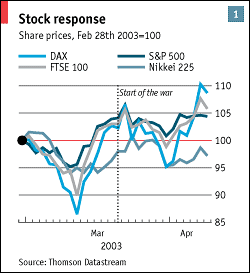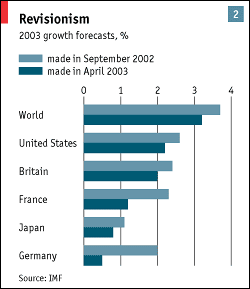|
| ||||||
|
| |
 | |
|
|
STOCKMARKETS could not resist a brief cheer at the beginning of the week, as American troops reached the centre of Baghdad and a military victory in Iraq seemed near. On April 7th the main markets in America and Europe rose sharply. But then they had second thoughts. Next day, most of the gains were clawed back. Even as the uncertainty of war dissipated, investors could see more starkly that the outlook for the world economy remains far from cheery.
The good economic news is largely about what did not happen. In particular, Iraq's oilfields were not systematically torched. Nightmare scenarios had envisaged oil at $50 a barrel or more for months, easily enough to tip the global economy into recession. In fact, oil prices have fallen by more than 30% over the past month, down from a peak of nearly $40 a barrel in the weeks before the war to around $25 now. With coalition troops in control of the southern oilfields—which account for 60% of Iraq's production—a prolonged oil shock is no longer a worry.
Rather the contrary, in fact. With Venezuela's oil production returning to normal and Saudi Arabia still pumping furiously, the president of OPEC, the oil producers' cartel, fretted publicly this week about an oil glut and a price collapse. That seems unlikely though, since Iraq's oil is sure to be slow to come on stream.
The bad news is that the world economy was extremely weak when the Iraq war started. In all the world's big economies, the most recent statistics have shown little but gloom. America's manufacturing activity index saw its biggest monthly drop since November 2001, with employers eliminating 108,000 jobs in March, after shedding 357,000 in February. Although some of this drop was due to the call-up of military reservists, the numbers were worse than analysts had expected.
In Europe, the news has, if anything, been even grimmer. In Germany, the latest figures show slumping business confidence, falling industrial production and gloomy consumers. In France, consumer confidence in March fell to its lowest level since 1996. The European Commission said in its spring forecast this week that the prospects for the EU “remain bleak in the very short term.”
Alan Greenspan, chairman of the Federal Reserve, has been a prominent optimist in America, arguing that once geopolitical uncertainties diminish, the economy is poised for renewed growth. At its March meeting, the Fed's monetary-policy committee decided not to cut interest rates, claiming that the hesitancy of the expansion “appears to owe importantly” to oil-price premiums and war jitters. Many analysts agree and expect a robust post-war rebound. The most bullish among them see America's annual GDP growth rate more than doubling, to 4.5%, in the second half of the year.
|
| |
 | |
|
|
The financial markets lend the optimists some support. The Dow Jones Industrial Average has risen by more than 10% since the war began, while in Europe the gains have been even bigger (see chart 1). Put together higher share prices and lower oil prices, argue the optimists, and you have the right ingredients for a rebound. Many claim the early evidence is already at hand. Consumer confidence, for example, rose in America in late March.
But many others are not convinced. The International Monetary Fund, in its World Economic Outlook published on April 9th ahead of this weekend's meetings of G7 finance ministers and the IMF, is among them. Even with a quick victory in Iraq, the IMF expects below-trend GDP growth in the world's big economies for the rest of this year. America's GDP, it reckons, will rise by only 2.2% in 2003. Europe's performance will be even more lacklustre, while Japan's GDP will rise by a mere 0.8% (see chart 2). The European Commission's forecast is that growth in the euro area this year will be only 1%, dragged down by Germany's puny 0.4%.
|
| |
 | |
|
|
Stephen Roach of Morgan Stanley, Wall Street's biggest bear, is more downbeat still. Even with a quick victory in Iraq, he reckons the world economy is on the brink of another recession. The pessimists' logic is simple. A quick military victory in Iraq will not be enough to assure a global recovery, because war-related jitters are not the only problem. A host of structural challenges—particularly the continued hangover of the 1990s bubble—leaves the world economy extraordinarily vulnerable. And the spread of the new disease SARS has only increased the risks, especially in Asia.
In the short term, the biggest test—for both pessimists and optimists—lies in America. Since 1995, the United States has accounted for around two-thirds of global growth. During both the 1990s boom and the subsequent bust, the country was the engine of the world economy.
America's corporate sector has made a massive adjustment since the bubble's collapse. After growing by an annual average of 10% in real terms between 1996 and 2000, investment fell by 5.5% a year in 2001 and 2002. Despite this dramatic belt-tightening, however, there are signs that more remains to be done. Traditionally, the corporate sector runs a small financial surplus at the end of a recession or early in a recovery, but American companies are still in deficit. And, despite falling investment, America's capacity utilisation is close to its record low. Both factors suggest that a sustained increase in investment could be some way off.
A bigger problem is America's consumers. They have adjusted far less than companies have to the bubble's collapse. Although the saving rate has risen, Americans have continued to spend by tapping into housing wealth through mortgage refinancing. With house prices and mortgage rates flatter, that process is slowing down.
If house prices were to wobble, the outlook would be far worse. An analysis in the World Economic Outlook points out that 40% of house-price booms are followed by busts, and that these busts cause twice as much economic damage as stockmarket collapses. Whether America has a property bubble is hotly disputed. Mr Greenspan suggests that it does not, arguing that there is no national housing market in America, and no sign of excess supply. Nonetheless, America's house prices, on average, have risen by 28% in real terms since 1996.
Offsetting the gloom is the fact that American economic policy has already cushioned the pain of post-bubble adjustment, and looks likely to continue to do so. Short-term interest rates are 1.25% and, despite Mr Greenspan's optimism, nobody doubts that the Fed will do more if the economy falters. Fiscal policy has been dramatically loosened, with both lower taxes and higher spending. In 2002, federal fiscal stimulus was worth 2% of GDP.
Further stimulus is likely this year. The IMF expects America's budget deficit to be 4.6% of GDP, up from 3.6% in 2002, though some of this expansion is offset by tightening elsewhere as cash-strapped states are forced to balance their budgets. This week, both houses of Congress approved nearly $80 billion of extra spending for the war and homeland security. And, despite current wrangling in Congress, further tax cuts are also expected.
Europe faces many of the same problems as America, but with a much less accommodating economic policy. Conventional wisdom has long held that Europe would avoid most of America's post-bubble fall-out because far fewer Europeans own stocks. That sanguine attitude looks increasingly wrong.
Investment in Europe has been contracting since the middle of 2000, and Europe's bank-dominated financial system may be exacerbating the post-bubble hangover. In Germany especially, bank profits are weak, corporate insolvencies are surging, and falling equity prices have eroded banks' reserves. An IMF analysis suggests that these factors are heightening banks' risk aversion and undercutting the credit process, a tale that bears some similarity to Japan's. Add to this the fact that labour and product markets are still too rigid, and it is small wonder that the outlook for Europe is grim.
Moreover, policymakers are much less helpful than in America in easing the adjustment. Although Germany's government recently announced plans to cut job protection and improve work incentives, the overall pace of deregulation has been snail-like. With central bankers obsessed by fears of inflation, monetary loosening has been too little and too late. The European Central Bank cut rates to 2.5% in March, but failed to cut them again last week, despite a fresh barrage of gloomy figures. Fiscal policy is no better, hamstrung in the euro area by the strictures of the stability and growth pact. Germany, for instance, is cutting spending and raising taxes, even as its economy weakens.
European economies outside the euro area have been doing rather better than those within it. The commission is forecasting growth in 2003 of 2.2% for the British economy, which it says has performed “rather well” of late. Gordon Brown, the chancellor of the exchequer, produced a budget this week that promises a stimulatory rise in public borrowing over the next two years.
In Japan, policymakers' inability to deal with the consequences of a burst bubble is nothing new. But the outlook there is, if anything, deteriorating. The spurt at the end of 2002—when Japan's was one of the fastest-growing rich economies—has proved transitory. Domestic consumption has weakened sharply. After four consecutive years of falling prices, deflationary expectations are deeply entrenched.
A new, and unexpected, dollop of gloom comes from the rest of Asia. With overall GDP growth of 6% last year, Asia's economies, excluding Japan, were a rare bright spot. Unfortunately, the SARS outbreak could dull that growth this year. In Singapore and Hong Kong, the effect has already been dramatic. Hong Kong's retail sales, for instance, fell by 50% in March. Based on a 60% reduction in tourism over the next three months, and a return to normal thereafter, analysts at Morgan Stanley have revised down projections for Asian growth this year from 5% to 4.6%.
Add all these pieces together and the conclusion is clear. World economic growth this year will be modest at best and will be driven—yet again—by the engine of America. While helpful in the short term, this continued reliance on America is perhaps the biggest reason to fret. For it means that the American current-account deficit, already above 5% of GDP, will rise. A deficit of 7-8% of GDP within the next few years no longer looks outlandish.
An external deficit on that scale is not sustainable. Yet no other economic area looks capable of taking over from America as an engine of global growth. Until that changes, any reduction in America's deficit will spell a weaker world economy. Long after the war has ended, that threat will lurk in the background.
| Copyright © 2003 The Economist Newspaper and The
Economist Group. All rights reserved. |